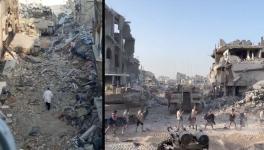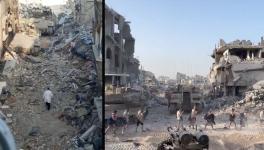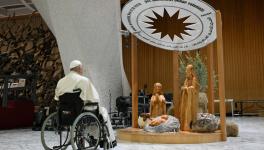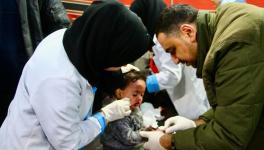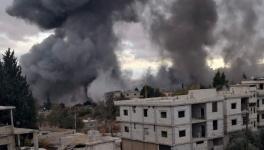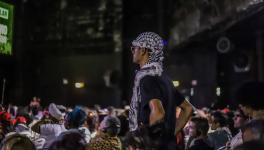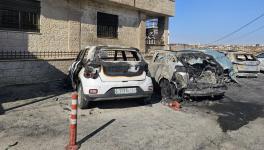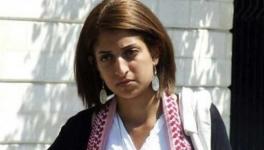Yahya Sinwar: From Refugee to Resistance Leader
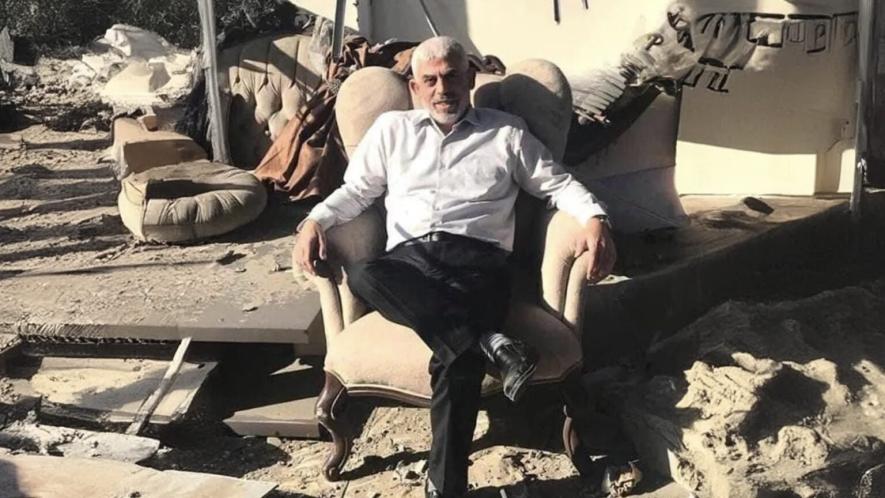
Yahya Sinwar outside his home after a failed assassination attempt. Photo: archive
One week ago, on Wednesday, October 16, Yahya Ibrahim Hassan Sinwar, also known as Abu Ibrahim, was killed in combat in the southern Gaza strip in the city of Rafah. Sinwar dedicated his life to struggling for the liberation of Palestine and resisting the occupation.
While Western media outlets have termed him a “terrorist mastermind” and his death as an achievement to be celebrated, this narrative seems to be in direct contradiction with the sentiments of people in Palestine and across the region. This is in part due to the fact that, for many, his story represents the decades-long story of oppression and resistance of the Palestinian people. From refugee, to political activist, to prisoner, and to resistance fighter, many identify with his trajectory and celebrate what they call his heroic end, being killed while defending his people and his land.
The refugee
Yahya Sinwar was born in a refugee camp in the town of Khan Younis in the Southern Gaza strip in 1962. His parents were from Palestine’s coastal city of Majdal Asqalan that became known under the Israeli occupation as Ashkelon. They were forcibly displaced from the city by Zionist militias in 1948 to Khan Younis.
Sinwar would later reflect on his upbringing in the refugee camp in his novel, “The Thorn and the Carnation”. In it, he addressed the suffering of living as a refugee, highlighting the miserable living conditions in refugee camps in terms of dwelling, meager diet, shortage of water and power supplies, and worn-out clothes distributed by the United Nations Relief and Works Agency for Palestine Refugees (UNRWA) twice a year. The novel also shows that the impact that life in a refugee camp had on him as a child, where his favorite game with other children was an imaginary confrontation between Palestinians and Israeli Occupation Force soldiers.
The political activist
Upon commencing his Bachelor’s degree in Arabic studies at the Islamic University in Gaza, Sinwar helped pioneer the Islamic Bloc and held a number of positions within the student council at the university. Due to his anti-occupation activism at the university, Sinwar was arrested by the Israel Occupation Forces (IOF) the first time in 1982 for several days.
In 1985, he was re-arrested by IOF again for several months, during which he met Sheikh Ahmed Yassin, who a couple of years later founded the Islamic Resistance Movement Hamas. Upon his release, Sinwar co-founded Munazzamat al-Jihad w’al-Dawa, also known as Majd, a security apparatus, whose main role is to identify Palestinian collaborators with Israel within the Gaza Strip, and punish them for their espionage activities. Majd was later merged into Hamas.
Sinwar was again arrested by the IOF in 1988, but was this time given four life sentences for his involvement in capturing and killing two Israeli soldiers and four suspected Palestinian spies.
Sinwar’s prolonged imprisonment; a journey of determination
Sinwar’s time in prison was spent studying and developing his knowledge and capabilities, preparing himself for his release. While in detention, he learned Hebrew which permitted him to closely follow Israeli politics, society, and culture, in an apparent effort to better understand his enemy, and learn security related matters, particularly those related to the IOF.
The determined prisoner also managed to write his first novel “The Thorn and the Carnation”, and smuggle it out in sections, being assisted by dozens of his fellow prisoners. The novel was published in 2004, while Sinwar was still imprisoned. His second book “Glory”, which explores the assassinations carried out by Israel’s internal security services against Palestinian resistance leaders, was published in 2010. One year later, Sinwar was released from jail along with 1000 other Palestinian prisoners in the Gilad Shalit prisoners swap deal.
“Resistance till liberation”
In 2012, Sinwar was elected as a member of Hamas political bureau, and he was tasked with supervising the military wing of the movement the al-Qassam Brigades. In 2017, he became Hamas’s leader in Gaza. In the same year, reflective of his support of Palestinian unity, he spearheaded Hamas’ reconciliation talks with the Palestinian National Liberation Movement Fatah, and the Palestinian Authority (PA) under the supervision of Egypt.
In 2018 and 2019, when tens of thousands of Palestinians in Gaza marched towards the Gaza border in the peaceful Great March of Return every week, Sinwar saluted this non-violent resistance to the occupation. Although the protest aimed at peacefully breaking the blockade on the enclave which began in 2007, the IOF cracked down on Palestinian protesters violently, leaving 220 people killed and many others injured.
In 2021, Sinwar was re-elected as Hamas’s chief in Gaza and played a significant role in “the Sword of Al-Quds” battle, which was launched in response to frequent Israeli incursions into Al-Aqsa mosque. During the same year, Sinwar escaped an Israeli assassination attempt unharmed, after an Israeli airstrike hit his house in Khan Younis.
On October 7, 2023, Al-Qassam Brigades launched operation “Al-Aqsa Flood” in response to Israeli crimes against the Palestinian people and against Al-Aqsa Mosque, and as a reaction to the acceleration of Arab-Israeli normalization. Consequently, the IOF launched a genocidal aggression on Gaza which continues to this day, massacring tens of thousands of people. Israel considered Sinwar as the mastermind of Al-Aqsa Flood, and declared him its most wanted man. In August, 2024, Hamas named Yahya Sinwar as the leader of the movement’s political bureau after the assassination of Ismail Haniyeh in Tehran.
During its one-year genocide in Gaza, Israeli media and officials alleged that Sinwar was hiding in tunnels, surrounding himself by Palestinian civilians and Israeli captives as human shields, in a bid to distort his image. On Thursday, October 17, Israel announced that Sinwar was killed in a live combat after clashing with IOF infantry soldiers for several hours the day earlier. The victorious end of the Palestinian resistance leader refuted all Israel’s false claims and proved to the world that he was fighting in the frontlines to defend his people and land.
On Friday October 18, Hamas confirmed that its chief Yahya Sinwar was killed in armed clashes with IOF soldiers, confirming that the movement will continue his approach in resisting the occupation until the liberation of Palestine with Al-Quds (Jerusalem) as its capital. Hamas also asserted that it will not stop fighting or return Israeli captives, until Israel stops the aggression, withdraws from Gaza, and releases Palestinian prisoners from Israeli jails.
Sinwar, called the “iron man”, who refused to surrender to his enemy until his last breath, was a father of three children and considered a father to the Palestinian people in addition to being an iconic resistance leader. His people have portrayed him as a hero, who turned October as the month of Glory, which marked Sinwar’s birth, his release from a prolonged imprisonment, the launch of operation “Al-Aqsa flood”, and eventually his death.
Get the latest reports & analysis with people's perspective on Protests, movements & deep analytical videos, discussions of the current affairs in your Telegram app. Subscribe to NewsClick's Telegram channel & get Real-Time updates on stories, as they get published on our website.










